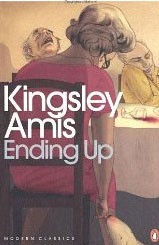July 30, 2013
 Way way back where here on this here blog, I posted some (though no one, I hope, would say too much) about the fine, fine collection Everyday Drinking by Kingsley Amis. If you’re interested in writing about drinking, or drinking, or reading, or any of those things jumbled up as in a blender in some way, then I strongly suggest you read said collection. But also check out Mr. Amis’ novels and such, cause they’re darn fine as well. And sometimes have amazing Cocktail Talk-ing going on, like in the below.
Way way back where here on this here blog, I posted some (though no one, I hope, would say too much) about the fine, fine collection Everyday Drinking by Kingsley Amis. If you’re interested in writing about drinking, or drinking, or reading, or any of those things jumbled up as in a blender in some way, then I strongly suggest you read said collection. But also check out Mr. Amis’ novels and such, cause they’re darn fine as well. And sometimes have amazing Cocktail Talk-ing going on, like in the below.
Shorty recovered himself, no mean feat after the MacKelvie-provided shot of green Chartreuse, and the Fishwicke-provided shot of Bénédictine he had thrown down on top of everything else.
—Kingsley Amis, Ending Up
February 17, 2009
 Cut the clamoring–I know I sloshed it up about Kingsley Amis just down the page, but I wanted to get another quote in quick, before I forget (hey, I’m getting older by the day. Just like you by the way). The following is from the second part of Everyday Drinking, called, strangely, “Every Day Drinking,” which is a collection of columns Mr. Amis wrote for some London newspaper I haven’t yet tracked down, cause I was too busy writing this. Each column is shortish and on a different subject, making them brilliant bus reads (not as brilliant as a Herbie the Fat Fury comic, but darn close). The following quote’s near to my heart cause it’s about Campari, which I love, and about drinks using it–drinks I also love, if I may be so bold:
Cut the clamoring–I know I sloshed it up about Kingsley Amis just down the page, but I wanted to get another quote in quick, before I forget (hey, I’m getting older by the day. Just like you by the way). The following is from the second part of Everyday Drinking, called, strangely, “Every Day Drinking,” which is a collection of columns Mr. Amis wrote for some London newspaper I haven’t yet tracked down, cause I was too busy writing this. Each column is shortish and on a different subject, making them brilliant bus reads (not as brilliant as a Herbie the Fat Fury comic, but darn close). The following quote’s near to my heart cause it’s about Campari, which I love, and about drinks using it–drinks I also love, if I may be so bold:
Next in line comes Campari, which as everyone knows has made an immense impression on the British market in the last twenty years or so. Not my cup of tea, alas. But, hurray, an acceptable drink can be cobbled together from this and another innocuous potation. Take two parts Italian vermouth and one part Campari (or in another recipe, one of each), mix them with ice and add Pellegrino or soda water and a slice of orange, and you have an Americano. Good at lunchtime, and before Italian food.
If you feel that, pleasant as it is, it still lack something, throw in a shot of gin and the result is a Negroni. This is a really fine invention. It has the power, rare with drinks and indeed with anything else, of cheering you up. This may be down to the Campari, said by its fans to have great restorative powers.
–Kingsley Amis, Everyday Drinking
February 10, 2009
There are good drink writers, and then there’s Kingsley Amis. Okay, that’s oversimplifying, but if I underline “writers” above I may take some of the oversimplification out of the equation (of course, that’s like saying I’m taking the buttermint out of the Drowsy Chaperone–probably doesn’t make much sense to any right minded sort). Mr. Amis (sadly departed, meaning I’ll never get to have that drink with him I’d like to have had. Though reading him while drinking at least gets us cocktail communing on some level) might not always have the, umm, intense bartenderly craft approach that some do, as he’s focused mostly on drinking at home, and also didn’t have the reach of ingredients as we do now (and in addition because a lot of pomp probably didn’t stir his drink), but the writing reaches such a fun, engaging, and just damn good height that I find myself forgetting I’m on the bus when reading it on the bus. And laughing out loud lots, and thinking I could take almost every sentence (or, if not every sentence, every other one) and pull it out for a quote that each drinker I know must read. Which means I’ll probably have more from him up on the site, which means you can think of this particular quote as the opening liquid salvo before a long night’s imbibing. This is from the first book in his drinking triptych (all three of which are collected in Everyday Drinking), On Drink, from the beginning of the chapter entitled, “The Boozing Man’s Diet:”
The first, indeed the only, requirement of a diet is that it should lose you weight without reducing your alcoholic intake by the smallest degree. Well, and it should be simple: no charts, tables, menus, recipes. None of those pages of fusspottery which normally end–end, after you have wasted minutes ploughing your way through–“and, of course, no alcohol” in tones of fatuous apology for laying tongue to something so pikestaff-plain. Of course? No alcohol? What kind of people do they think we are?
–Kingsley Amis, Everyday Drinking
 Way way back where here on this here blog, I posted some (though no one, I hope, would say too much) about the fine, fine collection Everyday Drinking by Kingsley Amis. If you’re interested in writing about drinking, or drinking, or reading, or any of those things jumbled up as in a blender in some way, then I strongly suggest you read said collection. But also check out Mr. Amis’ novels and such, cause they’re darn fine as well. And sometimes have amazing Cocktail Talk-ing going on, like in the below.
Way way back where here on this here blog, I posted some (though no one, I hope, would say too much) about the fine, fine collection Everyday Drinking by Kingsley Amis. If you’re interested in writing about drinking, or drinking, or reading, or any of those things jumbled up as in a blender in some way, then I strongly suggest you read said collection. But also check out Mr. Amis’ novels and such, cause they’re darn fine as well. And sometimes have amazing Cocktail Talk-ing going on, like in the below.





















